#maya c. popa
Text
I made it through
April, May, June; it seemed
I had outsmarted grief
but pulled the hanged man
card repeatedly—the self-same
sorrow said a different way.
— Maya C. Popa, from “Signal”
6K notes
·
View notes
Text

— Maya C. Popa, from "Duress," Wound Is the Origin of Wonder
3K notes
·
View notes
Text
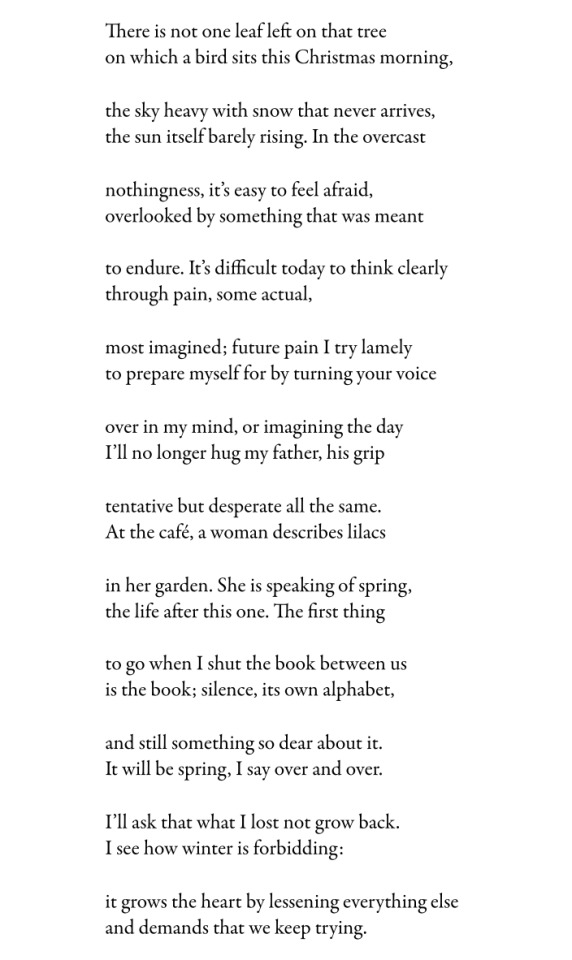

letters in winter by Maya C. Popa
154 notes
·
View notes
Text
[...] our days like rivers at the mouth
of a sea so cold, so quiet, so blue.
Maya C. Popa, final lines to Reprise
from here – thank you, i-am-a-watercolor
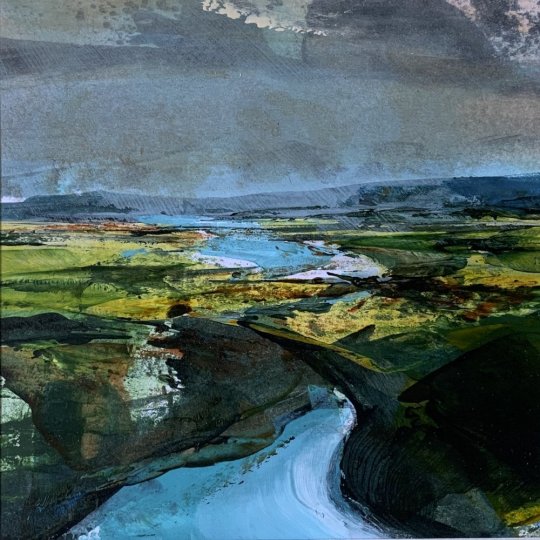
Emma Jaynes Holmes, Salt Marshes at Dyfi Estuary – see here
45 notes
·
View notes
Text
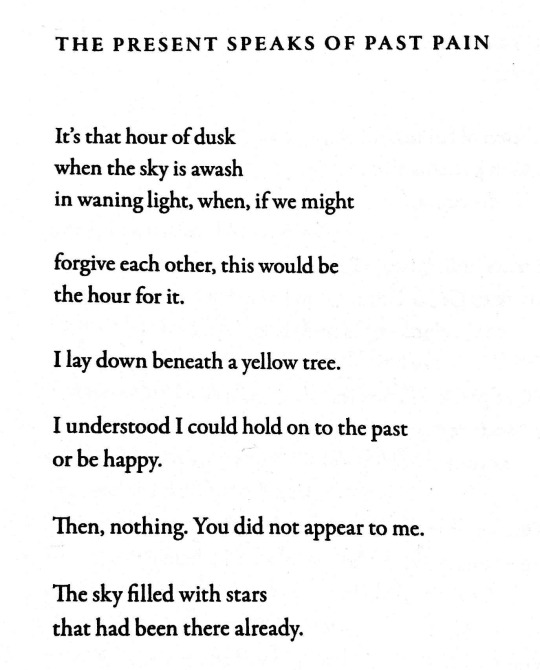
Maya C. Popa, from Wound Is the Origin of Wonder
85 notes
·
View notes
Text

Dear Life, Maya C. Popa
213 notes
·
View notes
Text
April 13, 2024: Broken Periodic, Maya C. Popa
Broken Periodic
Maya C. Popa
No one who has ever had a childhood
wants what’s happening. No one
who has ever wondered anything:
where the rain’s headed in her steel hooves.
Questions wrongly put swell
like moths under a light. On the streets,
everything looks human. You forget
certain animals are bloodless injured.
You must imagine some other color
that means hurt. At night, you sleep
with something like your gifts: to anguish
and ascribe a language, music.
To slice a fig the long way and linger.
To grieve for a country.
To grieve without a country to grieve.
--
Also by Maya C. Popa: Wound is the Origin of Wonder
Today in:
2023: Speech to the Young: Speech to the Progress-Toward (Among them Nora and Henry III), Gwendolyn Brooks
2022: We Lived Happily During the War, Ilya Kaminsky
2021: Hurry, Marie Howe
2020: Oh, Robert Creeley
2019: It Was Summer Now and the Colored People Came Out Into the Sunshine, Morgan Parker
2018: In Two Seconds, Mark Doty
2017: Aubade, Louis MacNeice
2016: Before, Ada Limón
2015: Sign for My Father, Who Stressed the Bunt, David Bottoms
2014: Ullapool Bike Ride, Chris Powici
2013: Clothespins, Stuart Dybek
2012: Ghost Story, Matthew Dickman
2011: Graves We Filled Before the Fire, Gabrielle Calvocoressi
2010: On Being Asked To Write A Poem Against The War In Vietnam, Hayden Carruth
2009: The Bear-Boy of Lithuania, Amy Gerstler
2008: Today’s News, David Tucker
2007: All There is to Know About Adolph Eichmann, Leonard Cohen
2006: Gamin, Frank O’Hara
2005: [this is what you love: more people. you remember], D.A. Powell
11 notes
·
View notes
Text

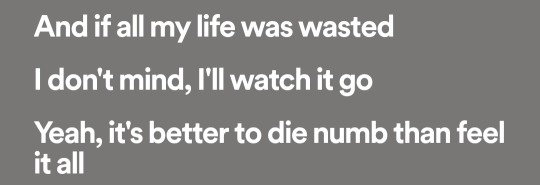













worth living
maya c. popa, duress // noah kahan, growing sideways // unknown // unknown // gabriel mistral, selected prose and prose-poems //
megan chance, the spiritualist // faridah àbíké-íyímídé, where sleeping girls lie // james baldwin, giovanni's room // @bookishjules, from @ann-perkins4 // emily lloyd jones, the hearts we sold // the strumbellas, shovels & dirt // albert camus // antoine de saint-exupéry // the strumbellas, shovels & dirt // jeff buckley
#the opposition of those noah kahan and strumbellas lyrics have been itching at me for a long time#web weaving#words#noah kahan#the strumbellas#maya c. popa#gabriel mistral#faridah àbíké íyímídé#james baldwin#emily lloyd jones#<- that one i learned is actually often misattributed to virginia wolf#albert camus#antoine de saint exupéry#jeff buckley
17 notes
·
View notes
Text

“Please take this grain of a grain of hope so that mine won’t shrink.” Denise Levertov for you, friends:
[thanks to Dr. Maya C. Popa]
13 notes
·
View notes
Text

Dear Life, Maya C. Popa
[ Text ID: I can't undo all I have done unto myself, / what I have let an appetite for love do to me. ]
55 notes
·
View notes
Text

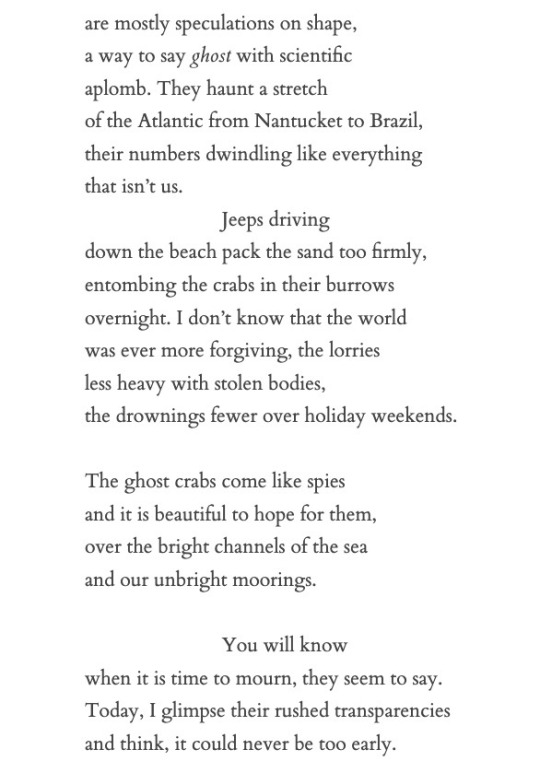
Maya C. Popa, “Ghost Crabs”
306 notes
·
View notes
Text
I can’t undo all I have done to myself,
what I have let an appetite for love do to me.
I have wanted all the world, its beauties
and its injuries; some days,
I think that is punishment enough.
— Maya C. Popa, from "Dear Life," Wound Is the Origin of Wonder
885 notes
·
View notes
Text

one way or another by Maya C. Popa
140 notes
·
View notes
Text
Dear Life
By Maya C. Popa [x]
I can’t undo all I have done unto myself,
what I have let an appetite for love do to me.
I have wanted all the world, its beauties
and its injuries; some days,
I think that is punishment enough.
Often, I received more than I’d asked,
which is how this works—you fish in open water
ready to be wounded on what you reel in.
Throwing it back was a nightmare.
Throwing it back and seeing my own face
as it disappeared into the dark water.
Catching my tongue suddenly on metal,
spitting the hook into my open palm.
Dear life: I feel that hook today most keenly.
Would you loosen the line—you’ll listen
if I ask you,
if you are the sort of life I think you are.
5 notes
·
View notes
Text
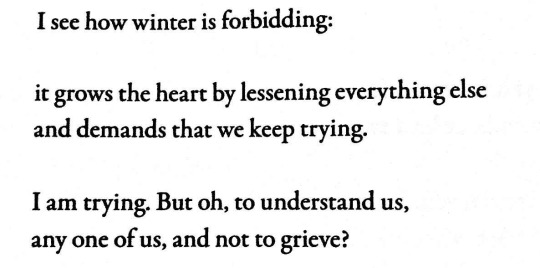
Maya C. Popa, from “Letters in Winter”
13 notes
·
View notes
Text
Q&A with Dora Malech and Laura T. Smith
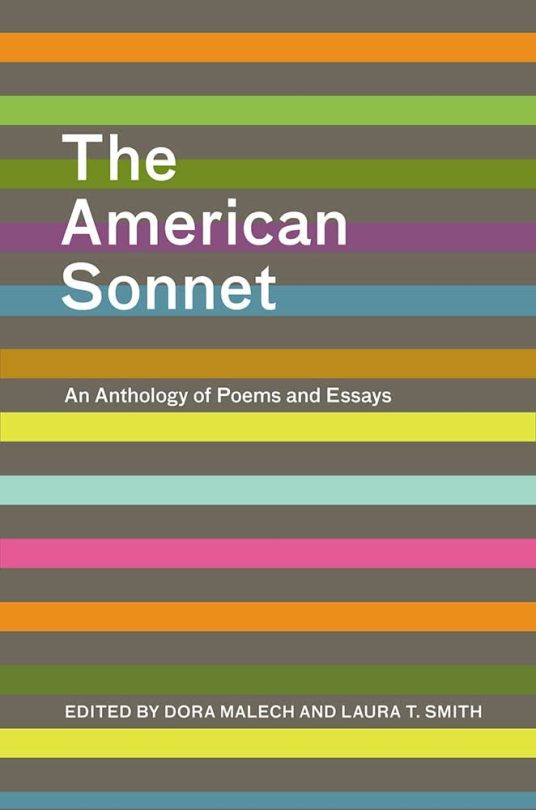
M: Can you talk a bit about what inspired your close look at the American sonnet? What, as you see it, are the strengths of this prescribed form?
D/L: From the start of this project, we were both struck by the current explosion in the contemporary sonnet—in variety, form, and sheer number—and wanted to place this proliferation in some historical context. Poetic influence is hardly a straight line; we wanted to gather threads and weave the plurality of American sonnet writers like Gwendolyn Brooks, Wanda Coleman, Adrienne Rich, Paul Laurence Dunbar, Emma Lazarus and so many others into conversation with each other and with our moment.
As this book first started to take shape, we were both teaching sonnet courses and we knew that we were equally interested in the political and aesthetic potentials of very traditional and very experimental approaches to the sonnet. We also wanted to complicate perceived boundaries and delineations between those approaches. Part of the strength of this prescribed form is its own deep history, that sonnets are always layered over other sonnets, so each sonnet gestures toward this history. In some sense, all sonnets become metasonnets. The tradition is on one hand a lot of metatextual clutter, but it's also a lot to draw upon, pieces you can use.
We created the kind of book we were hungry for as teachers, but also as readers, writers, and scholars. The familiarity and identifiability of the sonnet also makes it a great form for subverting expectations; we hope a collection like ours similarly offers the opportunity for both recognition and provocation.
M: What trends or patterns (or lack thereof) did you notice as you curated your selection of sonnets?
D/L: We always knew that we were interested in telling a story about the way the sonnet form appealed to and was an important tool for marginalized writers: women writers and Black writers and immigrant writers and queer writers of sonnet, for example. We also knew early on that the container of the “American” was problematic but also useful, and I think you see that sense of “but also” all over the book. There's an American story here to be told, but it constantly stretches toward the international—connecting to colonial histories, migration, diaspora—and so the American sonnet is a rubric we chose to retain, with the reservations, complications, and nuance that we hope come through in the book.
In terms of patterns that emerged as we were building the collection, one of things we see clearly in this collection is the distinct lineages—we anticipated a lesbian sonnet, an African American sonnet, a women's sonnet, a jazz sonnet, but there are also lineages of the immigrant sonnet, the diasporic sonnet, the labor sonnet, the minimalist and maximalist sonnets, the narrative sonnet, the prose sonnet. Essayists and poets in this collection center disability and neurodiversity; they celebrate—and, perhaps more notably, question and renounce—Americanness; they translate into and write outside of English. And we hope our collection underscores the fact that these are not innovations and conversations new to the 21st century. The subtraditions and their lineages became an important story here, as did these traditions of troubling and experimentation in form.
M: What most surprised you as you worked on this project? (Any new discoveries about the form?)
D/L: We knew we had a lot to work with going into the project, but as we began to compile lists, the number and range of sonnets was truly staggering. The final book was able to contain just a tiny fraction of what we had compiled. And then we each had individual finds: new sonnets, new sonnet scholars who we weren't familiar with before the project. We hope the book contains surprises for the reader as well: for example, Emma Lazarus’s iconic sonnet “The New Colossus” alongside her sonnet “Assurance,” which remained unpublished until 1980.
The community that gathered in and around this volume was also a wonderful surprise.
And about the form—we knew this form was capacious, but it is even more capacious than we thought it was. That's a simple thing to say, but it's true. The essays’ various methodologies also yield surprises about the sonnet, so readers should come away with a wealth of approaches not only to how one might write a sonnet, but how one might read a sonnet.
M: What do you hope general readers will gain from this anthology?
D/L: We think that poetry lovers already know that the sonnet is in an exciting time, and we hope that the book adds to that excitement and the sense of the possibility there. But general readers, or student readers, don’t necessarily know this. So, for general readers and students, we hope they get pleasure and surprise from the poems, and that the essays help readers access even more pleasure. And we believe that the sheer aesthetic and historical range of the collection will yield new discoveries and connections for even the most avid reader of sonnets.
4 notes
·
View notes